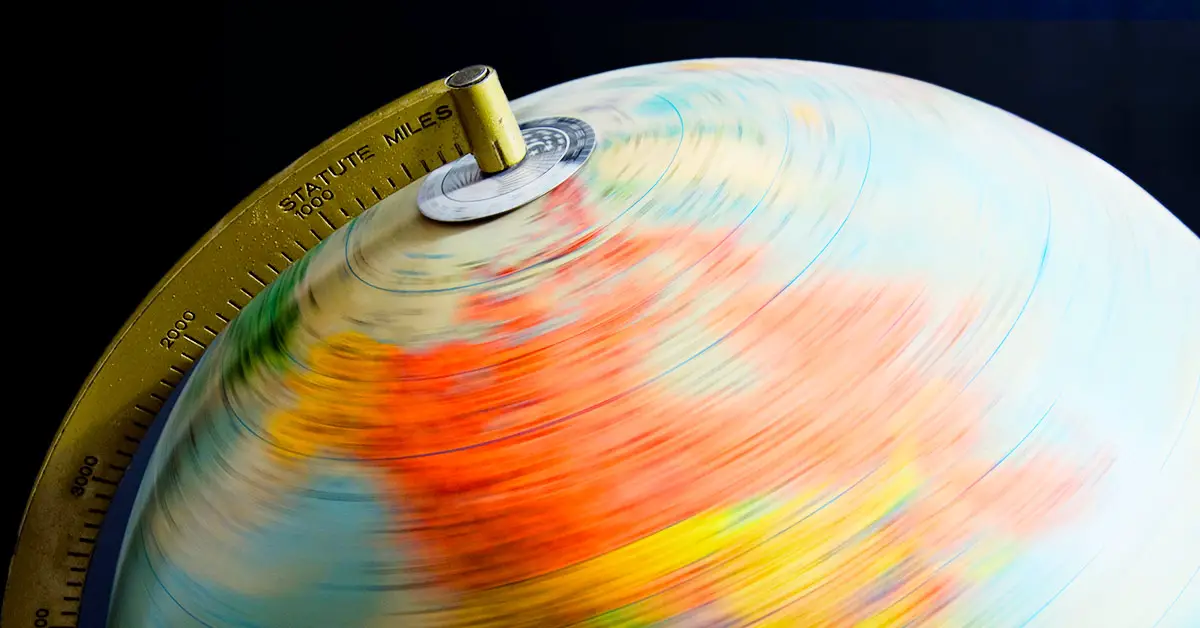The science is in: It’s not a question as to if the Earth is spinning faster, but a fact that it already is. Now scientists are trying to determine what the implications of the earth spinning faster will be. (1)
The Earth Is Spinning Faster
The Earth is spinning faster than it has in 50 years, meaning the Earth takes less than 24 hours to make a complete rotation. The shortest day recorded so far was on July 9 of last year, when the Earth completed a rotation of 1.4602 milliseconds shorter than the full 24 hours. (1)
This is quite a change from the previous records, which showed that the Earth was actually gradually spinning slower for a few decades. Since the 1970s, scientists have actually been adding leap-seconds occasionally in order to keep atomic time and solar time lined up properly. (1)
They have added leap seconds to 27 days since then, with the last one on December 31, 2016 Leap seconds are only ever added to either the last day of June or December. (1)
Now, the world’s time keepers have to make the decision as to whether they should add a “negative leap second”, aka delete a second from time. (1)
“It’s quite possible that a negative leap second will be needed if the Earth’s rotation rate increases further,” said Peter Whibberley, a senior research scientist at the National Physical Laboratory. “But it’s too early to say if this is likely to happen.” (2)
Why Is The Earth Spinning Faster?
Scientists aren’t 100% sure why the Earth is spinning faster, but the consensus is that it is related to global warming, the melting of the glaciers, and the rising sea levels. (3)
When the polar ice melts, that water runs off into the sea. The weight of that frozen water is no longer pressing down on the rock underneath it. Without that extra weight to hold it down, the rock juts upward, causing the North and South Poles to become less flat and therefore the Earth more round. (4)
This redistribution of mass from the water in the sea and the changing shape of the planet cause the Earth to shift slightly on its axis and therefore spin faster. (5)The phenomenon is known as “Monk’s Enigma” after oceanographer Walter Monk who first studied it. (5)
Speeding Up and Slowing Down
According to a recent study done by scientists from Harvard and the University of Alberta, while the Earth’s crust (what we are standing on) has been slowing down, the Earth’s core has actually been speeding up for a really, really long time. (3)
“Over the past 3000 years, the core of the Earth has been speeding up a little, and the mantle-crust on which we stand is slowing down,” says study co-author Mathieu Dumberry of the University of Alberta. (3)
Read: Our Sun Has Entered a New Cycle, And It Could Be One of The Strongest Ever Recorded
What Does This Mean For the Planet?
Don’t get too stressed out just yet: Scientists estimate that the Earth is spinning only about a half a second faster on average each day. (1) The Earth spinning so fast that it becomes unlivable (if it ever does) is extraordinarily far into the future. (6)
Satellite Problems
If the Earth does continue to speed up, however, this could cause things such as satellites could be thrown off. This would then interrupt television broadcasting, communications, military and intelligence operations. (6)
Would this be inconvenient and force space agencies to spend lots of money to adjust or replace their satellites? Yes. Catastrophic to the human race and life as we know it? Absolutely not. (6)
Shorter Days
That being said, if the planet were to speed up a lot (say by 100mph), this would make our days two hours shorter, meaning we’d either have to adjust to a 22-hour day or we’d have to set our clocks back by two hours every single day. (6)
This would be like having a two-hour daylight savings time every day and would most certainly throw off our natural body clock. Animal and plant life would also have trouble adapting to this new schedule. (6)
Extreme Weather
That much faster spinning could also cause more severe and extreme weather, such as stronger hurricanes. An increase of 100mph would also cause water to accumulate at the equator, putting places like Northern Australia, the Amazon Basin, and equatorial islands underwater. (6)
Many other catastrophes and weather problems could happen at even greater speeds, however, as was already stated, it is unlikely for the Earth to reach those speeds. If it ever does, it will happen gradually over the course of millions of years. (6)
“There’s no conceivable way that the Earth could spin up so dramatically,” said NASA astronomer Sten Odenwald. “To spin faster it would have to be hit just right by the right object, and that would liquify the crust so we’d be dead anyway.” (6)
Keep Reading: Aliens exist and they’re bunkered under Mars with humans, ex-Israeli space official says
Sources
- “Earth spinning faster than it has in 5 decades, scientists say.” WGN Tv. Nexstar Media Wire. January 5, 2021.
- “The Earth is spinning faster now than at any time in the past half century.” Telegraph. Sarah Knapton. January 4, 2021.
- “Is Global Warming Changing How Fast the Earth Spins?.” Smithsonian. Erin Blakemore. December 15, 2015.
- ” Twetieth century sea level: An enigma.” PNAS. Walter Munk.
- “Reconciling past changes in Earth’s rotation with 20th century global sea-level rise: Resolving Munk’s enigma.” Advances. Jerry X. Mitrovica, et al. December 11, 2015.
- “What would happen if Earth started to spin faster?” Pop Sci. Sarah Fecht. May 17, 2017.

